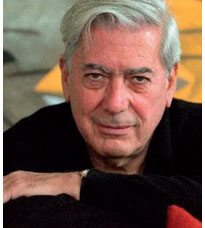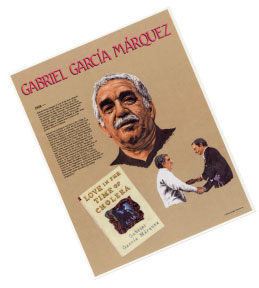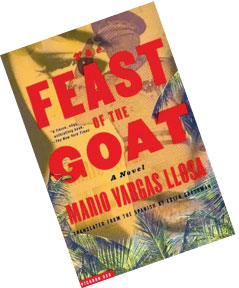|
Dictator novels:
Llosa's life and times
 In last week's 'Boom and Beyond' column, I gave a general overview of
Dictator Novels by Latin America writers in response to various
dictatorships. Mario Vargas Llosa was among the authors specifically
mentioned in the column and this was in connection with his best seller
' The feast of the goat'. It is a coincidence that the announcement of
his 2010 Nobel Prize for Literature came a couple of days later. It
therefore seems fitting to dedicate this week's column to Vargas Llosa's
life and writings. In last week's 'Boom and Beyond' column, I gave a general overview of
Dictator Novels by Latin America writers in response to various
dictatorships. Mario Vargas Llosa was among the authors specifically
mentioned in the column and this was in connection with his best seller
' The feast of the goat'. It is a coincidence that the announcement of
his 2010 Nobel Prize for Literature came a couple of days later. It
therefore seems fitting to dedicate this week's column to Vargas Llosa's
life and writings.
Mario Vargas Llosa was born on March 28, 1936, in the southern
Peruvian city of Arequipa. For the first 10 years of his life he lived
in Cochabamba, Bolivia, with his mother and grandparents. He returned to
Peru in 1946 when his parents, who had divorced shortly before his
birth, were reunited. The family settled in Magdalena del Mar, a
middle-class Lima suburb.By the time he was 16, Llosa was working
part-time for several Lima tabloids, mainly covering crime stories. His
first book, ' Los Jefes', a collection of short stories, was published
in 1958 when he was 22.
 These years proved to be difficult for Vargas Llosa, since he and his
father did not see eye to eye on his writing ambitions. "We were
opposites and we did not respect each other," he said. "In Bolivia when
I wrote, my grandparents and mother praised me for it. When my father
discovered that I was a writer, he had the opposite reaction. The
bourgeoisie of Lima scorned literature -they considered it an alibi for
idlers, an activity of the upper class." Fearful that his son was in
danger of losing his virility because of his passion for writing, Vargas
Llosa's father shipped him off to Leoncio Prado, an institution that the
author described as half reform school and half college, run by fanatics
of military discipline. "It was the discovery of hell for me," Vargas
Llosa said. "I understood what Darwin's theory meant in the struggle for
life." These years proved to be difficult for Vargas Llosa, since he and his
father did not see eye to eye on his writing ambitions. "We were
opposites and we did not respect each other," he said. "In Bolivia when
I wrote, my grandparents and mother praised me for it. When my father
discovered that I was a writer, he had the opposite reaction. The
bourgeoisie of Lima scorned literature -they considered it an alibi for
idlers, an activity of the upper class." Fearful that his son was in
danger of losing his virility because of his passion for writing, Vargas
Llosa's father shipped him off to Leoncio Prado, an institution that the
author described as half reform school and half college, run by fanatics
of military discipline. "It was the discovery of hell for me," Vargas
Llosa said. "I understood what Darwin's theory meant in the struggle for
life."
The painful experiences at Leoncio Prado were the basis for his first
novel, 'The Time of the Hero' (1963). The work gained instant notoriety
when Peruvian military leaders condemned it and burned one thousand
copies in the courtyard of Leoncio Prado. Praised for its stylistic and
innovative craftsmanship, the novel presented a story of official
corruption and cruelty in a military institution. It won several major
literary awards in Europe and quickly established Vargas Llosa's
reputation as social critic and writer.
His next two novels were 'The Green House' (1969), a magical
realistic tale of an enchanted brothel, and ' 'Conversation in the
Cathedral' (1969), a narrative of the moral depravity of life in Peru
during the 1950s under dictator Manuel Odria. Both books provided
further variations on his themes of hypocrisy and corruption in Peruvian
society and politics.
In 1973 Vargas Llosa published his first humorous novel, 'Captain
Pantoja and the Special Service'. It was a black comedy about a naive
army officer who diligently obeys his commanding officers' order to
organize a group of prostitutes to service soldiers in desolate jungle
camps. The novel depicted the author's continual disdain for military
bureaucracy and incompetence with caustic wit.
Four years later his most internationally popular (and most
autobiographical), novel, 'Aunt Julia and The Scriptwriter' was
published. The semi-fictional, semi-autobiographical Mario is a young
student and would-be writer, whose careers and aspirations are disrupted
when he falls in love with his aunt-in-law. Pedro Camacho, an eccentric
Bolivian scriptwriter, has been hired at the radio station where Mario
works.
The youth envies the prodigious output of Pedro's intricate soap
operas. He hopes to learn from his new mentor the secrets of being an
artist. The chapters alternate between descriptions of Mario's amusing
and increasingly complicated life and Pedro's formulaic and decreasingly
coherent scripts, as each character is gradually overwhelmed by the
burdens and expectations they've created for themselves.
On a deeper level, "Aunt Julia and the Scriptwriter" is about
artistic failure. Mario's writing suffers because he is too busy living
life to the fullest, while Pedro's well-being deteriorates because he
barely experiences life at all. While Mario's life is the stuff of
literature, his attempts at short fiction are overly concerned with
artistic affectation. The final chapter completes this theme - the
writer who balances a passion for life and devotion to art is the one
who ultimately succeeds.
 This device of multiple-level storytelling from the point of view of
widely divergent characters is a hallmark of Vargas Llosa's work. Most
critics agree that the structures of his next two overtly political
novels, ' War at the End of the World' (1981) and 'The Real Life of
Alejandro Mayta' (1984) were shaped by it. In 1986 Vargas Llosa turned
his hand to detective fiction and wrote the fast-paced cops and killer
thriller ' Who Killed Palomino Molera' . Although the novel lacked the
thickly layered narrative scope of his other works, it clearly proved
the author's talents for writing sordid detail and earthy, comic
dialogue. This device of multiple-level storytelling from the point of view of
widely divergent characters is a hallmark of Vargas Llosa's work. Most
critics agree that the structures of his next two overtly political
novels, ' War at the End of the World' (1981) and 'The Real Life of
Alejandro Mayta' (1984) were shaped by it. In 1986 Vargas Llosa turned
his hand to detective fiction and wrote the fast-paced cops and killer
thriller ' Who Killed Palomino Molera' . Although the novel lacked the
thickly layered narrative scope of his other works, it clearly proved
the author's talents for writing sordid detail and earthy, comic
dialogue.
His 1987 work 'The Storyteller' returned again to the theme of
tale-telling from multiple points of view. It relates the adventures of
a nameless narrator who is fascinated by the almost mystical
transformation of his college friend, Saul Zurantas, a Peruvian Jew and
former student of ethnology, who leaves civilization to live and tell
tales among the Machiguenga tribesmen in the depths of the Amazonian
rain forests. "Who is purer or happier because he's renounced his
destiny?"
The storyteller asks as he roams the jungle with the Machiguenga,
people who must continually walk in order to fulfil their obligation to
the gods and preserve the earth and the sky and the stars. "Nobody," the
storyteller responds. "We'd best be what we are. The one who gives up
fulfilling his own obligation so as to fulfill that of another will lose
his soul."
A haunting, deeply spiritual novel, 'The Storyteller' is entirely
different in scope and tone from Vargas Llosa's later work 'Elogio de la
Madrastra' (1988), an erotic tale of sexual tension between a stepmother
and stepson, described by the author as a "diversion." An English
version, which translates 'In Praise of the Stepmother', was published
in 1990.
It was an erotic novel about a beautiful but naughty little boy. The
later novels are amazing works from a man who temporarily abandoned his
isolation as a writer to pursue an active political career. This was to
fulfill what he considered his obligations toward improving the moral,
social and economic quality of life in his country.
In 1990 Vargas Llosa became the candidate for president of a
centre-right coalition called the Democratic Front (Fredemo). He was
opposed by the candidate of the Change (Cambio) 90 Party, Alberto
Fujimori. The well-known author took an early lead but gradually lost
ground and in a run-off election was defeated by Fujimori. His book
about the experience, 'Tale of a Sacrifical Llama', released in June,
1994, offers a convincing self-portrait of a political innocent sinking
under a tide of democratic absurdities. This follows his work 'A Fish in
the Water: A Memoir' which detailed "his bittersweet look at the nearly
three years he spent in public life."
Vargas Llosa went back to his writing full-time after his brief
affair with politics. The coveted Planeta Prize for 1994, traditionally
awarded each year to a Spaniard for the best pseudonymous submitted
manuscript of fiction, went to Mario Vargas Llosa (whose application for
Spanish citizenship was approved in July).
His 'Lituma en los Andes' (translated as Death in the Andes) is a
story of political violence and social regression within a contemporary
Andean setting. His 1997 novel, 'The Notebooks of Don Rigoberto' marked
the first time any publisher had released a title in all
Spanish-language markets on the same day. Sixteen of the 26 countries
involved (including Spain) have Santillana companies to print and
publish.
In the case of 'The Notebooks of Don Rigoberto', only Spain and
Mexico printed for all the others. In the first month of publication
250,000 copies were sold, 100,000 of them in Latin America.
 "I am very surprised, I did not expect this," the author told Spanish
National Radio last week. "I am very surprised, I did not expect this," the author told Spanish
National Radio last week.
He said that he thought it was a joke when he received the call
informing him that he won the Nobel Prize. "It had been years since my
name was even mentioned," he added.
"It has certainly been a total surprise, a very pleasant surprise,
but a surprise nonetheless."
He is South America's first laureate since Colombia's Gabriel García
Márquez won in 1982. Once close friends, the two men have been involved
in a ongoing feud since a punch-up in a Mexican cinema in 1976.
The academy's permanent secretary, Peter Englund, called the Peruvian
a divinely gifted storyteller and worthy winner of the 10 million
Swedish Kronor prize (168,971,851.62 LKR). For years many predicted that
the author would add the Nobel to his Cervantes prize but Llosa himself
said his liberalism (which he defined as defending democracy and the
free market) meant it was "completely impossible" for him to win.
"I have taken all the precautions necessary for them never to give it
to me," he joked last year.
|

